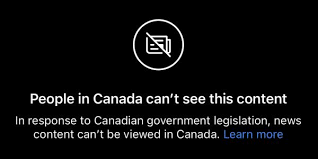In Canada’s battle with Big Tech, smaller publishers are caught in the crossfire

A person holds a cell phone in front of a Canadian flag in Montreal. REUTERS/Carlos Osorio
When the Canadian government first proposed the Online News Act, also known as Bill C-18, their goal was “to ensure fairness in the Canadian digital news marketplace and for independent local news businesses, including rural and remote news organisations, by ensuring that news media and journalists receive fair compensation for their work.”
The bill, which was passed by the Senate in June 2023, would require tech giants such as Meta and Google to make fair commercial deals with outlets for the news that is shared on their platforms. Shortly after the government introduced the bill, however, both Meta and Google announced they would block news in Canada on their platforms.
Meta followed through with its threat and now those living in Canada are unable to see any news on Facebook and Instagram.
This block is important as both platforms are very popular in Canada. According to our Digital News Report 2023, 29% of Canadians used Facebook for news. Around 11% used Facebook Messenger and 10% used Instagram for the same purpose. Google, also widely used for news in Canada, said that it would be removing links to Canadian news from search, news pages and Google Discover when the law goes into effect at the end of the year.
While Canadian audiences are undoubtedly harmed by the blocking of journalism, for independent local news business, which the Bill aimed to protect, this new media ecosystem can be a death sentence. To find out how the law is impacting these small news organisations, I spoke with three leaders of small Canadian publications impacted by the Meta blackout as well as with Canadian journalism scholar Alfred Hermida, who’s studied digital media in the country for several decades.
Canada’s losing bet
The aim of Canada’s Online News Act was to bring some of the money that the news industry lost during the online revolution back into the pockets of news organisations. The government even calculated that Google and Meta have a combined 80% share of the CAD$14 billion online ad revenues seen in the country in 2022.
However, the new legislation may make things worse for Canadian outlets, and while public broadcaster CBC or legacy newspapers will unlikely suffer much due to their robust funding models and name recognition, smaller, independent publications are already seeing the impact of the new law.
Alfred Hermida is a digital media scholar and a professor at the University of British Columbia School of Journalism. Hermida’s research focuses on news digital startups in Canada, which has experienced a healthy growth since 2015, particularly in local communities.
“If you're a local startup, the key thing you need to do is develop your audience and social media has become very important for audience engagement,” Hermida says. “You don't have the marketing budget and the reach that the larger players have so social media is a good way to alert people that you exist.”
Since Meta’s rolling blackout just came into effect in August 2023, it is hard to determine exactly how hard local news organisations have been hit, but Hermida estimates that between 20% to 30% of audiences for these organisations that rely so heavily on Facebook in particular have disappeared overnight.

One of those small news organisations is River Valley Sun. When Theresa Blackburn launched it in 2019, her goal was to be an ‘ultra local news source’ for her community across the Western Valley of the eastern province of New Brunswick, along the Saint John river.
The outlet serves the approx 25,000 residents of the region, which spans between the rural towns of Perth-Andover and Nackawic. Starting as a monthly printed paper, Blackburn’s outlet became a daily news outlet during COVID-19 to cover all the developments of the pandemic to an underserved community. Its circulation is around 6,000 copies, distributed in 93 locations in the region.
The River Valley Sun didn’t even have a website, so their news articles were posted directly on Facebook. “Facebook helped us and gave us the space to put our stuff without having to spend the resources and the time in learning how to make a website, which I'm doing now, obviously, but Facebook allowed us to get our message out,” Blackburn says.
With a follower count of almost 19,000, Blackburn says their weekly engagement was quite healthy before the Meta blackout. Then, in early August, Blackburn saw their online traffic essentially disappear overnight.
“We've seen so many small newspapers and small radio stations and little outlets die horrible deaths before the government finally stepped in,” Blackburn says. “We have a situation where we in the news media have been decimated by the Googles and the Metas of the world and people are blaming the government, but I wish they would start blaming Meta because Meta has been taken [advertising money] out of our communities and never given it back.”
David Walberg is the Executive Director and CEO of Pink Triangle Press, a Canadian independent media organisation which publishes Xtra, a digital magazine focused on LGBTQ2S+ communities. Since August, they’ve also had a complete blackout on Facebook and Instagram for their audiences in Canada.
The magazine, which has over 56,000 followers on Facebook, has suffered massive declines in traffic. As of October, Walberg says that Xtra’s organic post impressions on the platform, which would have been in the many hundreds of thousands in a normal month, have dropped by over 75% whereas traffic referrals from Facebook users in Canada are down by 90%.
“We are a smaller publisher so we really rely on what we call “discovery” for people to find us,” says Walberg. “A lot of people who need the kind of information that we provide to the community may not know our brand name, so we really relied on Facebook in particular, but also increasingly on Instagram, for people to find out about us.”
Since the Meta blackout, Walberg says that Xtra’s traffic referrals from Facebook users in Canada have dropped by over 80%. “The internet has been a game changer for people in our community, particularly people who live in more remote areas, to connect with the community and to not feel alone in the world,” he says.
Walberg points out that Xtra provides LGBTQ+ journalism from the perspective of the queer community, something often overlooked by the mainstream media. “People still need to connect; people still feel vulnerable,” says Walberg. “One of our top stories [in August] was a story about accessing surgeries for trans people in Canada, so clearly there's a need for that kind of information.”
The Meta blackout has also affected IndigiNews, an independent digital news outlet doing journalism for Indigenous people, by Indigenous people. Publisher Eden Fineday says that over 40% of their total traffic came from Facebook before the Meta blackout.
“In Canada, at least in my experience, a lot of Indigenous communities connect with each other on Facebook,” she says. “That just became the default way of connecting.”
IndigiNews Instagram analytics show they had 54.7% fewer accounts engaged in August 2023 compared to July 2023 which coincides with the blackout.
A two-fold impact
Hermida points out that there is a two-fold impact of this blackout: people lose valuable sources of news and information, and publishers lose one of the key tools they have in developing and growing their audience.
“This is the casual reader who doesn't necessarily go to a news site, but relies on news coming to them,” he says, echoing our own research on news consumption. “That somebody in the local community stumbles across something that's happening in their neighbourhood on Facebook is vitally important because these are the people who don't make an effort to find the news.”
Meta’s retaliation against news in Canada comes in a context where Facebook has already been taking a step back on news around the world. They have laid off a number of high-profile employees central to its journalism programmes, they have stopped paying US news publishers for their content, they have reallocated resources away from the Facebook News project, and they even retired the term ‘news feed’ in favour of ‘feed’. Most recently, they announced that they would be removing their dedicated tab for news content in the UK, France and Germany.
Alongside with Meta blacking out news in Canada, the company has also pulled back on its partnership with The Canadian Press news agency that saw the company support the hiring of a number of emerging journalists at the national newswire service. It is unclear if Meta’s other investments to Canadian news organisations have also been cancelled. I reached out to Meta for a statement and will include any input from them if they respond.
“Google and Facebook have announced more than 130 different deals with news media in the last few years to provide support, either in training and services or in cash,” says Hermida. “So the risk is we are also going to lose all of that.”
Looking beyond Canada
Canada is not the first country to introduce a bill that would force tech companies to pay news media for their content. In 2021, Australia introduced the News Media and Digital Platforms Mandatory Bargaining Code.
Shortly after Australia passed their law, Facebook blocked all news content from its platform in the country while Google warned that the law would affect Australians ability to get the news from their site. A week after Facebook launched a news blackout in Australia, restrictions stopped when both Facebook and Google struck a deal with the government.
How did Australia manage to negotiate with Big Tech while Canada has not? According to Hermida, the fundamental difference is that the law in Australia did not technically ‘designate’ who the law applies for.
“What happened in Australia is that both Meta and Google haven't been designated and instead they made their own private deals with media groups,” he explains. “Because they made private deals, the Australian government then didn't designate them so they were never covered by the law.”
Over 30 commercial agreements between digital platforms and media organisations were signed in Australia accounting for AUD$200 million.
News organisations have invested this money back into their newsrooms. The Australian Broadcasting Corporation, for example, said that it expanded its regional and rural coverage and network of regionally based journalists. The Guardian Australia said its newsroom grew by over 40 journalists. Solstice Media, which owns a number of newspapers in the country, said they were not only able to hire more journalists, but they also invested in professional development for their current staff and upgraded its content management platforms and its video player.
The Australian Facebook news ban also came before legislation passed, giving both parties some leeway to continue negotiations whereas in Canada there is little flexibility as Bill C-18 has already passed.
“The key thing is [Google and Facebook] don't want to be regulated. They don't want to be told to do this,” says Hermida. “They want to be able to do this on their own terms.”
Other countries have failed before. Back in 2014, Google removed news from Spanish publishers from Google News in the country after the government passed a law requiring online aggregators to pay a copyright fee for linking to content created by newspapers and news publishers. The block also prevented users from other countries from finding links to Spanish articles on Google News.
A 2017 study found that this intervention did not have a significant impact on the reach of news sites, but it did increase audience fragmentation. In 2022, Google reopened Google News in Spain after the government changed the legislation allowing media outlets to negotiate directly with the tech giant.
Hermida does not foresee any tech company backing down any time soon in Canada. “The problem now is that the news industry is largely losing out, especially if you're not one of the major players like the Globe and Mail, Toronto Star or CBC,” he says. “It's a death sentence.”
No end in sight?
Big Tech’s fallout with Canadian news comes in the midst of a turning point in Canadian journalism.
The country’s biggest media conglomerates (Postmedia, Québecor and Bell Media) have laid-off hundreds of journalists and reduced their local news offerings in broadcasting and print. Most recently, Metroland, one of Ontario’s biggest newspaper publishers, announced it is cutting more than 600 jobs across its regional papers, around 60% of its total workforce. Amid this challenging environment, the news blackout from Meta is putting local and community journalism under threat.
The government does not seem to be backing down any time soon. The CRTC, the agency responsible for implementing the act, concluded a public consultation this fall to determine the bargaining process between platforms and news organisations. While the results of that consultation have not been made public, the actual bargaining is not set to begin until late-2024 at the earliest.
“We've gone from somewhere where the law was going to be enforced in December 2023 to somewhere where potentially we won't see any talks between platforms and media beginning until 2025,” says Hermida. “That would be the start of bargaining so you're left in a situation where potentially there's this limbo where we have another 18 months of nothing happening.”
Google, which has not yet blocked news in Canada and which is one of the funders of the Reuters Institute, published a lengthy response addressing its view of this legislation and has remained firm that it will go ahead and pull news content from their platform if the law comes into effect as intended in December.
While Google seems somewhat open to negotiations with the government, Meta appears more unwilling to do so. In an interview with CBC in June, a Meta spokesperson said they are not negotiating with the government on the bill. An exclusive story by Reuters revealed that Meta’s news block had almost no impact on Canadians' usage of Facebook, which would perhaps make the tech giant less keen in changing its trajectory.
“The response from news media in Canada has been trying to reach their audiences and say, ‘you can still visit us, you can come to our website. We have apps. We have all of this,’” says Hermida. “The challenge with that is that you're addressing the audience who would visit you anyway. It doesn't address the people who are on Facebook doing something else.”
A survey done in mid-September by the Centre d'études sur les médias in the French-speaking province of Quebec suggests that the blackout may be having some impact on news consumption. Up to 32% of respondents said that the blackout has impacted their news habits. Asked whether they have changed their consumption habits on Facebook or Instagram, 29% said they've been driven to other sources like going directly to the news media while 34% said that this form of consumption does not apply to them.
Despite the extra hurdles created by the new law, the outlets I spoke to are exploring different audience development models so they don’t rely so much on social media.
For example, Theresa Blackburn from the River Valley Sun newspaper says the fallout from her outlet’s reliance on Facebook has forced them to create their own website, which they advertise through their monthly printed edition.
“This was very frustrating for us and for our readers, but we are working through the bugs and I'm learning the website,” says Blackburn. “The website's only been up a few weeks and we've got tens of thousands of hits already. It's not as organic, but it will be.”
David Walberg from Pink Triangle Press says they are rethinking their audience development strategy, which is to focus on “go where people are” by creating specific content for different platforms that do not necessarily link back to the site. That means still having a presence on social platforms, but not relying on them for traffic.
“It means a shift away from social media and preferring your own owned and operated platforms,” says Walberg. He also says that these changes will also push them into establishing more partnerships with other media companies, broadcasters and distributors to “build one another's audiences.” They are also experimenting with platforms such as Reddit, Discord and TikTok.
Eden Fineday from IndigiNews says they have started reaching out to other smaller outlets to support each other and trade ideas on how to reach audiences without Facebook. But she also says that the resilience of smaller news outlets depends on audiences' willingness to support them.
“Go to their website, even if that's not your habit,” she says. “Sign up for their newsletter and find ways to connect. That's the best way to support us right now.”
In every email we send you'll find original reporting, evidence-based insights, online seminars and readings curated from 100s of sources - all in 5 minutes.
- Twice a week
- More than 20,000 people receive it
- Unsubscribe any time







